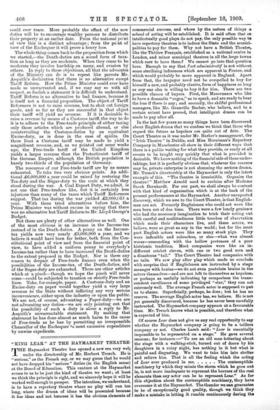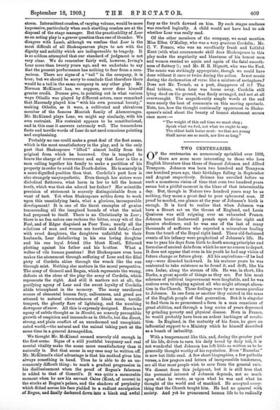"KING LEAR " AT THE HAYMARKET THEATRE. T HE Haymarket Theatre
has opened a new era very well under the directorship of Mr. Herbert Trench. He is " serious," as the French say, or we may guess that he would not have dropped his " serious " duties (in the English sense) at the Board of Education. This venture at the Haymarket seems to us to be just the kind of theatre we want ; at least we think the principle is right, and we sincerely hope it will be worked well enough to prosper. The intention, we understand, is to have a repertory theatre where no play will run too long, where the drama of ideas will be presented because it has ideas and not because it has the obvious elements of commercial success, and where by the nature of things a school of acting will be established. It is said often that cs intellectually good plays do not pay, the only possible way to have repertory theatres is to induce the State and the munici- palities to pay for them. Why not have a British Theatre, like the Theatre Francais, established as a national centre in London, and minor municipal theatres in all the large towns which care to have them P We cannot go into that question here. Enough to say that rart aministrafif is not without some sterilising influences which are apparent in France, and which would probably be more apparent in England. Apart from that, the taxpayer need not be compelled to buy for himself a new, and probably elusive, form of happiness so long as any one else is willing to buy it for him. There are two possible classes of buyers. First, the Maecenases who like to have a dramatic "organ," so to speak, and are ready to bear the loss if there is any; and secondly, the skilful professional managers, like Mr. Granville Barker, who believe, and to a certain extent have proved, that intelligent drama can be made to pay after all.
In the last few years so many things have been discovered about English drama that we confess we think that those who regard the future as hopeless are quite out of date. The Court Theatre as it was under Mr. Barker's management, the " Irish Theatre " in Dublin, and Hiss Horniman's Repertory Company in Manchester all show in their different ways that there is a public waiting for what they provide, or ready at all events to be taught very quickly that what is provided is desirable. We know nothing of the financial side of these under- takings, but it is perfectly obvious that, whatever the reasons may be, private enterprise is not shunning the serious drama. Mr. Trench's directorship at the Haymarket is only the latest example of this. "The theatre is irresistible. Organise the theatre !" Matthew Arnold used to exclaim after Madame Sarah Bernhardt. For our part, we shall always be content with that kind of organisation which is at the back of the present performances at the Haymarket. Another unexpected discovery, which we owe to the Court Theatre, is that English- men can act. Formerly Englishmen who could act were like men born out of due time. There were a few lonely geniuses who had the necessary imagination to trick their acting out with careful and multitudinous little touches of observation which made their characters live, and these actors, we believe, were as great as any in the world; but for the most part English actors were like so many stuck pigs. They were inflexible and colourless, or else—what was almost worse—resounding with the hollow pretences of a poor histrionic tradition. Most companies were like an in- different cricket eleven, with one or two good men and a disastrous "tail." The Court Theatre had companies with no tails. We saw play after play which made us conclude with surprise that if Englishmen are instructed by a stage manager with brains—we do not even postulate brains in the actors themselves—and are not left to themselves as hopeless, or perhaps as usefully indicating by comparison the trans- cendent excellences of some privileged " star," they can act extremely well. The average French actor is supposed to put us to shame. Superficially, perhaps, he does ; but he has no reserve. The average English actor has, we believe. He is not yet generally discovered, because he has never been carefully instructed. The Haymarket company appears at a favourable time. Mr. Trench knows what is possible, and therefore what is expected of him.
Of course Lear does not give us any real opportunity to say whether the Haymarket company is going to be a tailless company or not. Charles Lamb said: "Lear is essentially impossible to be represented on a stage." He gave several reasons ; for instance :—" To see an old man tottering about the stage with a walking-stick, turned out of doors by his daughters in a rainy night, has nothing in it but what is painful and disgusting. We want to take him into shelter and relieve him. That is all the feeling which the acting of Lear ever produced in me The contemptible machinery by which they mimic the storm which he goes out in, is not more inadequate to represent the horrors of the real elements than any actor can be to represent Lear." As for this objection about the contemptible machinery, they have overcome it at the Haymarket. The thunder we can guarantee to be of exceptionally good quality, though we think they make a mistake in letting it rumble continuously during the
storm. Intermittent crashes, of varying volume, would be more impressive, particularly when such startling crashes are at the disposal of the stage manager. But the practicability of Lear as an acting play is a graver question than one of thunder. We disagree with Lamb, although we confess that Lear is the most difficult of all Shakespearean plays to act with the dignity and nobility which are indispensable to tragedy. It is so seldom attempted that our standard of judgment is not very clear. We do remember fairly well, however, Irving's Gear more than twenty years ago, and we undertake to say that the present performance has nothing to fear from a com- earison. There are signs of a " tail " in the company, it is true; but we should be sorry to conclude that therefore there would be a tail in the same company in any other play. Mr. Norman McKinnel has, we suppose, never done himself greater credit. Dumas pere, in pointing out in what various ways Othello was played by different actors, once remarked that Macready played him " with his own personal beauty," making Othello, as it were, a cultivated and chivalrous member of the famous Moorish family of Abencerrages. Mr. McKinnel plays Lear, we might say similarly, with his own restraint. His restraint appears to be constitutional, and in this case it answers extremely well. The tremendous facts and terrific words of Lear do not need conscious pointing and emphasising.
Probably no one could make a great deal of the first scene, which is the most unsatisfactory in the play, and is the only part that Shakespeare "lifted" almost bodily from the 9riginal from which he borrowed. One is tempted to brave the charge of irreverence and say that Lear is like a man calling together his family to make a partition of his property in order to avoid the Death-duties. He is scarcely in a more dignified position than that. Cordelia's part here is also strangely unsympathetic. Even though her sisters were diabolical flatterers, what harm in her to tell the honest truth, which was that she adored her father? Her scientific precision of statement is scarcely distinguishable from a want of tact. Yet when Shakespeare settles down to work upon this unsatisfying basis, what a glorious, incomparable development! It is one of the finest examples of genius transcending all the imagined bounds of what the mind had proposed to itself. There is no Christianity in Lear ; there is no fun unless one reckons the bitter, crazy wit of the Fool, and of Edgar disguised as Poor Tom; nearly all the relations of men and women are terrible and fatal,—Lear with cruel daughters, the daughters unfaithful to their husbands, Lear disbelieving in his one loving daughter and his one loyal friend (the blunt Kent), Edmund plotting against his father and his brother. What a welter of vile human passions ! But Shakespeare even here makes the atonement through suffering of Lear and the filial piety of Cordelia shine through the wrack like the sun through mist. Nothing else matters in the moral perspective. The army of Goneril and Regan, which represents the wrong, defeats at the close of the play the army of Cordelia, which represents the right. And still it matters not at all; the purifying agony of Lear and the sweet loyalty of Cordelia abide triumphant in the memory. The many unrelieved scenes of elemental human fury, callousness, and greed are attuned to natural circumstances of bleak moor, terrific tempest, the ghostly flare of lightning, and the numbing downpour of snow. All this is expressly designed. Here is no agony of subtle thought as in Hamlet, no scarcely perceptible growth of suspicion and innuendo as in Othello, but the direct, strong, and plain conflict of an unredeemed and unsophisti- cated world,—the natural and the animal taking part at the same time in a general Armageddon.
We thought Mr. MoKinnel seemed scarcely old enough in the first scene. Signs of a still youthful buoyancy and real mental vitality make the scene more unsatisfactory than it naturally is. But that scene in any case may be written off. Mr. McKinnel's chief advantage is that his method gives him always something in hand. Thus he is able to do an un- commonly difficult thing : to mark a gradual progression in his disillusionment when the proof of Regan's falseness is added to that of Goneril's. It was quite a memorable moment when he saw his servant Calms (Kent, of course) in the stocks at Regan's palace, and the shadows of perplexity which flitted across his face yielded to a radiant exculpation of Regan, and finally darkened down into a black 6.33,4 awful
fury as the truth dawned on him. By such stages madness was reached logically. A child would not have had to ask whether Lear was really mad.
Of the other members of the company, we must mention Miss Ellen O'Malley, who was a very gracious Cordelia ; Mr. 0. V. France, who was an excellently frank and faithful Kent (with what consummate skill does Shakespeare in this play make the angularity and bluntness of his honest men and women remind us again and again of the fatal smooth- ness of flattery !) ; and Mr. H. R. Hig,nett. who was the Fool. The music was strikingly appropriate, though we could have done without it once or twice during the action. Is not music during the declamation of verse like a mixture of metaphors ? Does not Mr. Trench, as a poet, disapprove of it ? The final tableau, when Lear was borne away, Cordclia still lying dead on the ground, was finely arranged, and not at all overwrought. The magnificently simple words at the end were surely the best of comments on this moving spectacle. Note, too, how the thought continually uppermost in Shake- speare's mind about the beauty of honest statement occurs once more
" The weight of this sad time wo must obey ;
Speak what we feel, not what we ought to say.
The oldest hath borne most: we that are young
Shall never see so much, nor live so long."











































 Previous page
Previous page